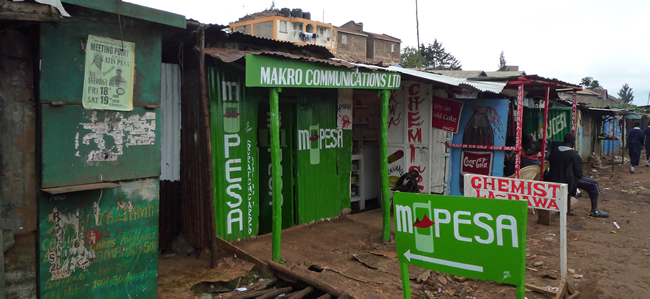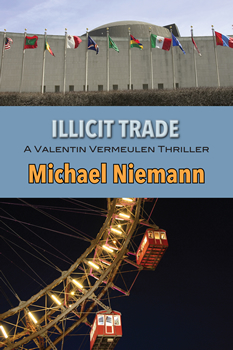Telling a Captivating Story
Michael Niemann kicked off his career as a mystery writer with a story featuring UN investigator Valentin Vermeulen, “Africa Always Needs Guns,” which was published in the 2012 MWA Anthology. In his previous life as a university professor, he wrote a book on regionalism and numerous articles on global and African issues. He has traveled widely through Europe and Africa. A native German, he now lives in southern Oregon with his wife, who keeps him grounded, and his dog, who gets him up early (presumably to write).
His debut novel, Legitimate Business, first published in 2014 and reissued this year, continues the exploits of Vermeulen. It’s a tight thriller set against the sandy hopelessness of Zam Zam camp in Darfur. The sequel, ILLICIT TRADE, is just out in the U.S. Vermeulen is now based at UN headquarters in New York, and it looks as though he’s settled down to a quiet life. But forged UN letters of introduction for several Kenyans to get visas for the US alert him to the illicit human trade.
Michael, you have published in a variety of respected academic publications. What motivated you to turn from your academic writing to fiction?
It was a gradual shift. Writing academic pieces definitely has its rewards. Creating a logical argument in support of a proposition can be as much fun as plotting a thriller. After I took two creative writing courses from my colleagues, I understood the importance of telling a captivating story. I missed that in academic writing. Another downside to academic writing is that one’s audience is rather narrow, mostly colleagues in the same specialized academic field. As writers, whether academic or fiction, we want to reach readers because we hope our story resonates with them. Writing fiction allows me to get out of the confines of academia and reach readers who wouldn’t have looked for my articles. I still do research for each book, but I enjoy the storytelling aspect in fiction a lot more.

I know you have spent considerable time in southern Africa. Why did you decide to set part of this story in Kenya rather than in South Africa, for example?
My first visit to the region was in 1989 when I conducted dissertation research in Botswana, Mozambique, and Zimbabwe. Since then I’ve been back many times, doing work in every country of the region except Namibia and Angola. So yes, South Africa and the wider region are close to my heart. The decision to set parts of ILLICIT TRADE in Kenya was motivated by simple logistics. The story starts with people obtaining US visas using forged United Nations letters. So I decided to set it in two cities that also host UN headquarters, Nairobi and Vienna.
Why did you choose the UN as the base for Vermeulen, and would you explain to us the role of his department within the organization?
I’ve long been an avid reader of spy and international suspense novels. Growing up in Germany, the Cold War was ever present. RAF jets flew overhead constantly, and I passed a Belgian Nike missile battery on my way to school. John Le Carré gave me a wonderful fictional context for that experience. When I decided to write stories with an international angle, I wanted a protagonist who wasn’t pursuing a particular country’s objectives. That made the UN a logical choice. But I still didn’t quite know how to begin until, by sheer happenstance, I came across the Office of Internal Oversight Services. It was created in 1994 to assuage concerns of the big contributors that the UN was wasting money. Its job is to audit UN Operations and investigate fraud. That allowed me to send my protagonist all over the world. As to my protagonist, I decided that he should be a Belgian citizen. I figured it was a small enough country that had long ago given up on global ambitions. Vermeulen grew out of that.
Much of the novel involves the machinations of the Immigration and Customs Enforcement authority and the plight of undocumented immigrants in the US. Even Vermeulen himself is in danger of being deported at one stage despite his UN credentials, and the detainees don’t seem to have even the same rights that arrested criminals would have. Is this an accurate picture of the situation, and does it help or discourage these types of illicit trades’?
The short answer is yes, it is accurate. The treatment of undocumented aliens in the U.S. has progressively worsened over the past two decades. Successive pieces of legislation have limited appeals and made access to legal representation difficult. If one tries to enter without proper documentation, even when fleeing oppressive regimes or situations, deportation is almost automatic. Access to legal council is not guaranteed and if you should find it, you’ll have to pay for it. Criminals indeed have more rights than undocumented aliens. ICE also utilizes a network of privately managed detention centers for aliens. Reports of abuses there are quite common. I was a resident alien for more than 30 years before becoming a citizen last year, and I’ve experienced some of the caprice with which agents treated non-nationals entering the country. Does it make a difference? No. Larger economic trends and changes in human security elsewhere have more impact on the flow of people than restrictive laws. And the restrictions have boosted the role of criminals who traffic desperate people into the country but for a steep price.

The recent restrictions on the entrance of travelers from some majority Muslim countries shows just how powerful border officers really are. Even after several judges issued temporary injunctions against the executive order, the officers continued to stop and in at least once case deport persons who had valid visas and/or resident alien status. I wrote the opening scene well over a year ago and am utterly dismayed that it is now happening in real life to people who have valid documents.
In ILLICIT TRADE, Vermeulen is helped by an African-American small-time hustler, Earle Jackson, from Newark. He finds an injured man and tries to help, but the man dies. Afterwards he discovers that the dead man is from Kenya, and that he has $2,500 in cash and the name and address of a doctor in his pocket. Jackson gets into hot water when he tries to shake down the doctor, but it’s left to him to get to the heart of the human trade in Kenya itself. In some ways Jackson is the hero of the story. Was one reason for introducing Jackson to approach the Kenyan thread from the perspective of a black person?

Earle Jackson is one of those examples of a character showing up that I hadn’t planned on. I chose Newark for the story because it is the urban center next to the ICE contract detention center in Elizabeth. Newark is a majority African American city, so I knew that once the action took me there, it had to involve a black character. At first, Jackson was just supposed to find the injured man. But once he was in the story, he wasn’t satisfied with a bit role. He proved to be rather resourceful, but still ended up in trouble, so sending him to Kenya became an intriguing twist. Yes, his perspective is different. He’s used to being surrounded by other black people. Going into a slum doesn’t trigger the “savior” complex in him as it sometimes does in white Americans. He sees the different shades of skin color and notices how they relate to social divisions.
What’s next for Vermeulen? Back to world hot spots? He seems less comfortable with his more formal position at headquarters.
Yes, Vermeulen will be back in hot spots. The next manuscript is almost ready to go to the publisher. It takes place in Mozambique, specifically Maputo, Beira and along the Pungwe river. The tentative title is Illegal Holdings.
*****
To learn more about Michael, please visit his website and follow him on Facebook and Twitter (@m_e_niemann).
- Out of Africa: Annamaria Alfieri by Michael Sears - November 19, 2024
- Africa Scene: Abi Daré by Michael Sears - October 4, 2024
- International Thrills: Fiona Snyckers - April 25, 2024


